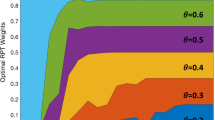Abstract
In a symmetric first-price or second-price auction, a bidding strategy is characterized as value-rationalizable if it can be viewed as being realized at a Nash equilibrium under the specification of a non-negative and increasing value function. In an environment where the underlying probabilistic framework is common knowledge, we investigate conditions for value-rationalizability by examining the value functions, which are induced by a bidding strategy. The existence of value-rationalizable strategies with infinite large induced functions is established. We argue that an improper specification of the value function should be attributed to bounded rationality. We show that, under assumptions, strategies which are not value-rationalizable are sub-optimal responses. Finally, the degree of irrationality is assessed by measuring the deviation of the induced function from being a proper value function in terms of its sign and monotonicity. The findings are illustrated by different examples in the independent private value paradigm and the interdependent value setting.
Similar content being viewed by others
References
Kagel JH, Levin D (1986) The winner’s curse and public information in common value auctions. Am Econ Rev 76(5):894–920
Kagel JH, Harstad RM, Levin D (1987) Information impact, allocation rules in auctions with affiliated private values: a laboratory study. Econometrica 55(6):1275–1304
Kagel JH, Richard JF (2001) Super-experienced bidders in first-price common value auctions: rules of thumb, Nash equilibrium bidding, and the winner’s curse. Rev Econ Stat 83(3):408–419
Simonsohn Y, Ariely D (2008) When rational sellers face nonrational buyers: evidence from herding on eBay. Manag Sci 54(2):1624–1637
Eyster E, Rabin M (2005) Cursed equilibrium. Econometrica 73(5):1623–1672
Crawford VP, Iriberri N (2007) Level-k auctions: can a nonequilibrium model of strategic thinking explain the winner’s curse and overbidding in private-value auctions? Econometrica 75(6):1721–1770
Engelbrecht-Wiggans R, Katok E (2008) Regret and feedback information in first-price sealed-bid auctions. Manag Sci 54:808–819
Engelbrecht-Wiggans R, Katok E (2009) A direct test of risk aversion and regret in first price sealed-bid auctions. Decis Anal 6(2):75–86
Bikhchandani S, Riley JG (1991) Equilibria in open common value auctions. J Econ Theory 53(1):101–130
Pearce DG (1984) Rationalizable strategic behavior and the problem of perfection. Econometrica 52(4):1029–1050
Osborne MJ, Rubinstein A (1994) A course in game theory. MIT Press, Cambridge, MA
Bernheim BD (1984) Rationalizable strategic behavior. Econometrica 52(4):1007–1028
Luo X (2016) Rational beliefs in rationalizability. Theory Dec 81:189–198
Levin D, Harstaad (1986) Symmetric bidding in second-price, common-value auctions. Econ Lett 20:315–319
Kokkala J, Berg, K, Virtanen K, Poropudas J (2019) Rationalizable strategies in games with incomplete preferences. Theor Decis 86(2):185–204
Battigalli P, Siniscalchi M (2003) Rationalizable bidding in first-price auctions. Games Econ Behav 45:38–72
Deckel E, Wolinsky A (2003) Rationalizable outcomes of large private-value first-price discrete auctions. Game Econ Behav 43:175–188
Klemperer P (2004) Auctions: theory and practice. Princeton University Press, NJ
Krishna VJ (2010) Auction theory. Academic Press, MA
Athey S, Hale PA (2002) Identification of standard auction models. Econometrica 70(6):2107–2140
Guerre E, Perrigne I, Vuong Q (2000) Optimal nonparametric estimation of first price auctions. Econometrica 68:525–574
Li T, Perigne I, Vuong Q (2002) Structural estimation of the affiliated private values model. RAND J Econ 33(2):171–194
Milgrom P, Weber R (1982) A theory of auctions and competitive bidding. Econometrica 50(5):1089–1122
Kolmogorov AN, Fomin SV (1975) Introductory real analysis. Dover Publications, New York
McAdams D (2007) Uniqueness in symmetric first-price auctions with affiliation. J Econ Theory 136:144–166
Athey S, Hale PA (2007) Nonparametric approaches to auctions. Handb Econ 6(A):3847–3865
Rudin W (1976) Principles of mathematical analysis. McGraw Hill, New York
Author information
Authors and Affiliations
Corresponding author
Ethics declarations
Conflict of Interest
The authors declare that they have no conflict of interest.
Additional information
Publisher’s Note
Springer Nature remains neutral with regard to jurisdictionalclaims in published maps and institutional affiliations.
Rights and permissions
About this article
Cite this article
Lorentziadis, P.L. Value-Rationalizability in Auction Bidding. SN Oper. Res. Forum 1, 12 (2020). https://doi.org/10.1007/s43069-020-0012-y
Received:
Accepted:
Published:
DOI: https://doi.org/10.1007/s43069-020-0012-y




